


|
"GUITAR TECHNIQUES" Interview [1] What is it about guitar instrumentals that appeal to you? [SK] Even though I grew-up in a musical home, my father was lyricist Sammy Cahn, filled with music and songs, sung by all the great singers from '40s and '50s, for some reason, when I heard Jazz for the 1st time, and all of those great Freddie King R&B instrumentals, I knew that this was the music for me. 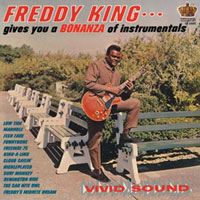 What helped me along the way in interpreting standards was that I had already absorbed almost all of the lyrics from having heard them so much. But, I love the challenge of crafting a very personal interpretation of any song that I choose to play and record. If I can't do that? Then it means that I'm just not ready to record it then. What helped me along the way in interpreting standards was that I had already absorbed almost all of the lyrics from having heard them so much. But, I love the challenge of crafting a very personal interpretation of any song that I choose to play and record. If I can't do that? Then it means that I'm just not ready to record it then.[2] What can an instrumental provide a listener that a vocal song can't? [SK] This is so subjective, and it is very hard for me to answer. Obviously, people, average people, NEED lyrics and vocals to best connect with music. It's just the nature of things. I don't ever expect millions of people to like or respond to my recordings. The problem is often that listeners, when hearing instrumental or non-singing music wonder, "What do I have to know to appreciate this music?" The answer is that, "You don't have to know anything!" You just have to listen, and allow your mind or imagination to wander and see if the music reaches you in some way. So, the instrumental allows the individual listener to form their own sense of what that piece meant - if anything. If someone hears a tune as a "love song" - then that's what it is. No matter what the composer might have intended. We can't control the way that someone hears things. [3] What are the tendencies with instrumentals that you aim to embrace or avoid (e.g. rhythms/harmony/playing approach/tones)? [SK] That's pretty simple! I never play or record music in hopes of trying to figure out how to appeal to masses of people. I don't conceive of music as trying to fit the songs, time-wise, into something like being under 4:30 to be more radio friendly. The length of any tune that I play just ends up being what it happened to be by chance. I don't put time constraints on anything. If a piece happens to be over 10-minutes long, so be it. However, no matter what, one makes music in hopes that people, as many as is possible, are going to enjoy it - and any musician or artist who says otherwise is a liar, or a fool! The thing is that you just never know how people are going to respond, when you try to begin by trying to figure that out, you've already lost something! [4] Is a typical song structure of intro/verse/chorus/verse/chorus/middle/outro chorus always relevant for an instrumental? [SK] Yes, of course! Music, all music, has to have some sense of structure and form - or contrasting sections or moods. Good music just does not flow on a straight emotional line from beginning to end. 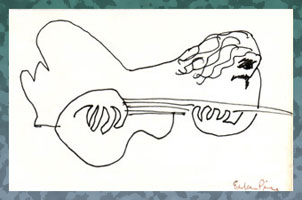 However, as music has progressed, as Jazz has progressed, the great artists are always seeking new and interesting ways of bending the old rules, and turning something classic into a Picasso-esque line drawing, where you don't know exactly what it is, or what's going on. It just depends upon your sense of taste and danger, as to how far you want to go with that kind of a concept for a song. However, as music has progressed, as Jazz has progressed, the great artists are always seeking new and interesting ways of bending the old rules, and turning something classic into a Picasso-esque line drawing, where you don't know exactly what it is, or what's going on. It just depends upon your sense of taste and danger, as to how far you want to go with that kind of a concept for a song.[5] How useful is studying a vocalist's approach for guitar melodies? [SK] This, in part, goes back to the earlier questions. If you are going to interpret a standard that is associated with a singer, or several singers, probably the way one particular singer interpreted that song resonates within you. For example, almost all the great Jazz artists whom I most admired and worshiped, they were all huge Nat "King" Cole fans. For me, it's simple, you just want to interpret the melody, any melody, slow or fast, with a sense of love, and deep respect. Miles Davis once said something like this: "You can't play a ballad well unless you know the lyrics!" To me, that pretty much says it all. [6] How do you start writing one; is there a typical approach or inspiration for you? [SK] This has always been difficult for me. I think that the composers in my area of music all have a sense of courage about writing tunes where they actually convince themselves that they are writing something that is completely original, and new under the sun. Of course, this is never true - everything, no matter what it is, sounds a little bit like something else that came before. But, as the composer, you have to have blinders on, and just go plowing ahead, as if what you are doing is original. In the end, many of us write tunes that start to sound like they were another tune that we had actually written 5-10 years earlier. That is dangerous and scary too. But, when writing, you have to be in a state of mind, where you don't even recognize that, until someone else points it out to you. I often become paralyzed, because I don't think that what I'm writing is good enough - so I throw it out, and start all over again. My latest album, "BACKLOG" has no original tunes by me at all! In the preparations for that recording, I couldn't even write a blues that I was happy with! I felt so pathetic!!! [7] What do you aim for when your performance is center stage for the duration of the instrumental? [SK] For me, as I am the artist on my own recordings, the guitar, my guitar, is ALWAYS going to be stating the melodies, and playing solos somewhere, everywhere! 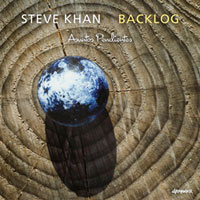 I enjoy the freedom of the guitar trio, or the expanded guitar trio with percussion. I like all the air and the space - it allows all the instruments to speak clearly. Sometimes, another voice, trumpet, saxophone, keyboards, has to be added, because it is simply the right thing for that song! That is my only guiding principle. I enjoy the freedom of the guitar trio, or the expanded guitar trio with percussion. I like all the air and the space - it allows all the instruments to speak clearly. Sometimes, another voice, trumpet, saxophone, keyboards, has to be added, because it is simply the right thing for that song! That is my only guiding principle.[8] Many vocal songs feature a guitar solo that starts low and slow, and then finishes high and fast. Is this structure a useful reflection for instrumental writing, developing pace and dynamics over the instrumental's duration? [SK] As stated in your question, this is something that never enters my mind when playing. A short guitar solo in the context of a Pop or R&B song can embody that kind of thought process, but that is much too calculated for the kind of music that I play. With modern recording techniques, obviously one can craft a better ending for a solo than the one that was improvised, but most of us would like a solo to be one complete thought - like a story with a beginning, a middle, and an end. But, as you mentioned, dynamics are essential, this goes without saying. [9] What type of guitar tone do you prefer for instrumentals? [SK] Over the years, this has changed. When I was making my earliest recordings in the mid to late '70s, all of those albums that I made for Columbia Records the tone was with overdrive, and I was playing a Tele back then. In the early '80s, when Eyewitness was formed with Anthony Jackson, Steve Jordan, and Manolo Badrena, I went back to something far more basic and I was playing a Gibson 335 with just some reverb and an occasional primitive stereo chorus pedal. Everything since then, now over 35 years of work, has been about perfecting and expanding upon that basic sound, and other personal sonic concepts, just trying to get it better. People are often shocked by how LOUD I am actually playing, even though the sound is still big, warm, and clean. But, it's all going out through 2 Marshall bottoms with two 12" speakers in each one. [10] Do you have favorite keys or tempos? [SK] No! Not at all. Although, I think that all of us do gravitate towards certain tempos where our own personal bullshit feels the best. But, I try to force myself out my particular comfort zones just to challenge myself. That's why it's great playing music when someone else is the leader, because you have to come-up to what is comfortable for them! As for keys? I simply always try to do what's right for the song!!! Serve the song, that's my guiding principle. Musicians often play standards in what is called the old "sheet music key" - and that's fine. 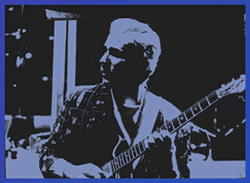 However, sometimes I will go to another key, because the melody does not sit well on the guitar in the usual key, meaning that it puts you too high or too low when compared to one's warmest register. However, sometimes I will go to another key, because the melody does not sit well on the guitar in the usual key, meaning that it puts you too high or too low when compared to one's warmest register.[11] Do you find minor or major keys easier to write in? [SK] Again, it really doesn't matter. For any song, for me, the most important elements to locate are MOOD and ATTITUDE - if I am approaching things in the best possible way, then the song will have those two qualities - it won't matter if it feels major, minor, or dominant. [12] Do you have any favorite modes? [SK] When it comes to improvising theories, long ago, before there were all the wonderful books and methods that exist now, players of my generation, we had to do it all ourselves, and come-up with concepts that made playing, improvising more fluid. Generally speaking, in the late '60s, I arrived at a way of playing where, for most chord formations, I was hearing everything in Dorian minor, but, I always treated "major" as major(Ionian) or Lydian. Then, I ended-up reducing most other sophisticated harmonies to melodic minor and all of its variations. And then, of course, there are all the widely varied synthetic modes, etc.!!! It's just never-ending what one can learn and explore. One must continue to do that, or you are just doomed to playing the same bullshit over and over, and over again!!! [13] What about modulations into new keys? [SK] This of course is a most effective technique, and sometimes, a song cries out for a shift of keys. However, in most Jazz tunes, the tonal centers are constantly shifting so that there is not often a sense of boredom because of that. But, for example, you could be playing a standard in Bb, and one soloist continues in that key, but perhaps, the 2nd soloist, would have his solo modulated to G major or something else? It that feels right, it can be a great device. [14] Do you view the backing band in a different way than you would on a vocal song? [SK] No! The band, the musicians I choose to play with, or record with, they are essential - of equal importance. I could never bring a vision of mine to life without them. 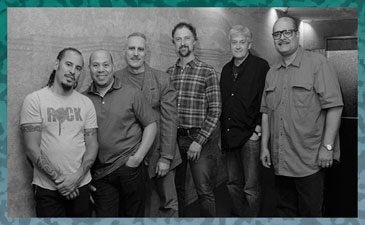 I always want to make certain that they feel that they are free to interpret what I've written, and to express their ideas about what feels best to them without fear. I select them because they are the right guys for the project - it's that simple. I always want to make certain that they feel that they are free to interpret what I've written, and to express their ideas about what feels best to them without fear. I select them because they are the right guys for the project - it's that simple.[15] What are your views on harmonizing melodies? [SK] To me, how I might harmonize any particular melody is a crucial part of the process of personalizing my interpretation of that song. Because one could choose to harmonize any one particular melodic note in countless ways, there are arrangers who make a song sound almost unrecognizable! That is never my goal. I don't want a song to become so abstract that no one knows what I'm playing. So, I try to do things in a way where the melody always speaks and, in a sense, sings to the listener, even though there are no lyrics, no vocals. [16] What three guitar instrumentals would you consider iconic and/or have inspired you? [SK] This is an impossible question to answer. Even if you asked me what 10 albums would I take to a deserted island to live out my final days, that would be a bit easier to answer, but still torturous. If people would like to see what albums and artists I have found important in my life, they can just visit the STEVE RECOMMENDS page at my website: www.stevekhan.com [Photos: Steve Khan Pen & Ink Drawing: Erika Price Steve @ Skyline Studios 1994: David Tan Backlog Group Photo @ Avatar Studios: Richard Laird] |